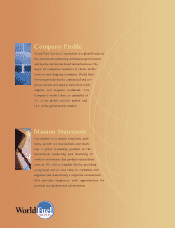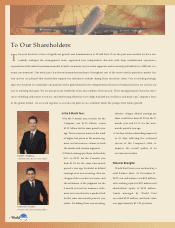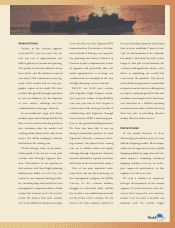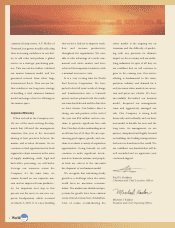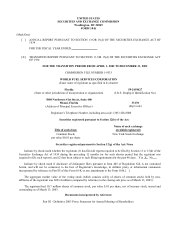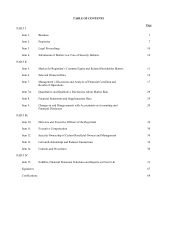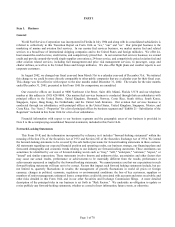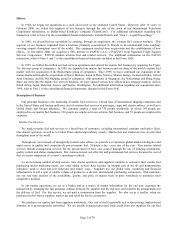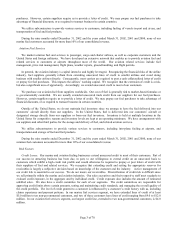World Fuel Services 2002 Annual Report Download - page 11
Download and view the complete annual report
Please find page 11 of the 2002 World Fuel Services annual report below. You can navigate through the pages in the report by either clicking on the pages listed below, or by using the keyword search tool below to find specific information within the annual report.purchases. However, certain suppliers require us to provide a letter of credit. We may prepay our fuel purchases to take
advantage of financial discounts, or as required to transact business in certain countries.
We utilize subcontractors to provide various services to customers, including fueling of vessels in-port and at-sea, and
transportation of fuel and fuel products.
During the nine months ended December 31, 2002 and the years ended March 31, 2002, 2001 and 2000, none of our
marine fuel customers accounted for more than 10% of our consolidated revenue.
Aviation Fuel Services
We market aviation fuel and services to passenger, cargo and charter airlines, as well as corporate customers and the
United States and foreign militaries. We have developed an extensive network that enables us to provide aviation fuel and
related services to customers at airports throughout most of the world. Our aviation related services include fuel
management, price risk management, flight plans, weather reports, ground handling, and flight permits.
In general, the aviation industry is capital intensive and highly leveraged. Recognizing the financial risks of the airline
industry, fuel suppliers generally refrain from extending unsecured lines of credit to smaller airlines and avoid doing
business with smaller airlines directly. Consequently, most carriers are required to post a cash collateralized letter of credit
or prepay for fuel purchases. This impacts the airlines’ working capital. We recognize that the extension of credit is a risk,
but also a significant area of opportunity. Accordingly, we extend unsecured credit to most of our customers.
We purchase our aviation fuel from suppliers worldwide. Our cost of fuel is generally tied to market-based formulas or
is governmentally controlled. We are usually extended unsecured trade credit from our suppliers for our fuel purchases.
However, certain suppliers require us to provide a letter of credit. We may prepay our fuel purchases to take advantage of
financial discounts, or as required to transact business in certain countries.
Outside of the United States, we do not maintain fuel inventory since we arrange to have the fuel delivered into our
customers’ aircraft directly from our suppliers. In the United States, fuel is delivered into our customers’ aircraft or
designated storage directly from our suppliers or from our fuel inventory. Inventory is held at multiple locations in the
United States for competitive reasons and inventory levels are kept at an operating minimum. We have arrangements with
our suppliers and other third parties for the storage and delivery of fuel, and related aviation services.
We utilize subcontractors to provide various services to customers, including into-plane fueling at airports, and
transportation and storage of fuel and fuel products.
During the nine months ended December 31, 2002 and the years ended March 31, 2002, 2001 and 2000, none of our
aviation fuel customers accounted for more than 10% of our consolidated revenue.
Risk Factors
Credit Losses. Our marine and aviation fueling businesses extend unsecured credit to most of their customers. Part of
our success in attracting business has been due, in part, to our willingness to extend credit on an unsecured basis to
customers which exhibit a high credit risk profile and would otherwise be required to prepay or post letters of credit with
their suppliers of fuel and related services. We recognize that extending credit and setting the appropriate reserves for
receivables is largely a subjective decision based on knowledge of the customer and the industry. Active management of
our credit risk is essential to our success. We do not insure our receivables. Diversification of credit risk is difficult since
we sell primarily within the marine and aviation industries. Our sales executives and their respective staff meet regularly to
evaluate credit exposure, in the aggregate and by individual credit. Credit exposure also includes the amount of estimated
unbilled sales. We also have a credit committee for each of our segments. The credit committees are responsible for
approving credit limits above certain amounts, setting and maintaining credit standards, and managing the overall quality of
the credit portfolio. The level of credit granted to a customer is influenced by a customer’s credit history with us, including
claims experience and payment patterns. In our marine fuel services segment, we have extended lines of credit of at least
$5.0 million to ten non-governmental customers, and two of these customers have lines of credit ranging from $9.0 to $12.0
million. In our aviation fuel services segment, our largest credit line, extended to two non-governmental customers, is $4.0
million.
Page 3 of 70


